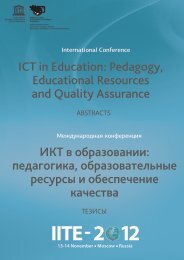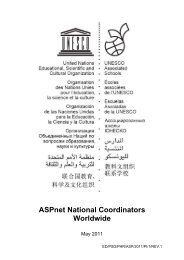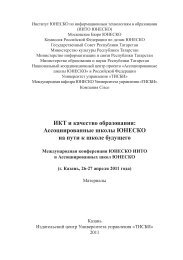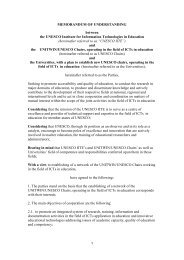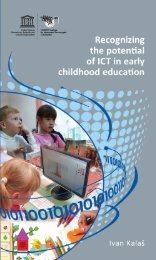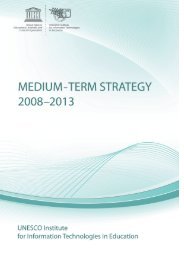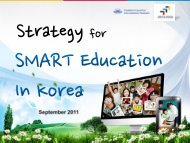UNESCO ICT Competency Framework for Teachers ... - unesco iite
UNESCO ICT Competency Framework for Teachers ... - unesco iite
UNESCO ICT Competency Framework for Teachers ... - unesco iite
Create successful ePaper yourself
Turn your PDF publications into a flip-book with our unique Google optimized e-Paper software.
<strong>UNESCO</strong> <strong>ICT</strong> <strong>Competency</strong> <strong>Framework</strong> <strong>for</strong> <strong>Teachers</strong><br />
6<br />
2<br />
THE PRINCIPLES<br />
The Policy context<br />
<strong>UNESCO</strong>’s education policies and projects<br />
Education is a central function of any nation or community. UNES CO and the UN see education as having the<br />
following aims:<br />
inculcating the community’s core values and passing on its cultural legacy<br />
supporting the personal development of children, young people and adults<br />
promoting democracy and increasing participation in society, particularly among women and minorities<br />
encouraging cross-cultural understanding and the peaceful resolution of confl ict, improving health and<br />
well-being<br />
supporting economic development, reducing poverty and increasing widespread prosperity.<br />
The <strong>ICT</strong> <strong>Competency</strong> <strong>Framework</strong> <strong>for</strong> <strong>Teachers</strong> project is part of a range of initiatives by the UN and its specialized<br />
agencies, including <strong>UNESCO</strong>, to promote educational re<strong>for</strong>m and sustainable economic development. The<br />
Millennium Development Goals (MDG), Education <strong>for</strong> All (EFA), the UN Literacy Decade (UNLD), and the Decade<br />
of Education <strong>for</strong> Sustainable Development (DESD) all aim to reduce poverty and to improve health and the quality<br />
of life, and they view education as an important contribution to these goals. 2 They aim to promote the equality<br />
of women and men and advance the human rights of all citizens, particularly <strong>for</strong> minorities. These projects all<br />
view education as key to economic development, as a way of enabling people to fulfi l their potential and take<br />
increasing control over decisions that aff ect them. They all see education as a right of all citizens. In addition, the<br />
EFA and DESD emphasize the quality of learning, both what is learnt and how it is learnt. UNLD and EFA focus<br />
on literacy as a key part of learning and education. EFA, DESD and UNLD emphasize the in<strong>for</strong>mal learning that<br />
takes place outside the school system, as well as learning in school. The <strong>UNESCO</strong> International Commission on<br />
Education <strong>for</strong> the 21st Century 3 views learning throughout life and participation in the society of learning as the<br />
key to meeting the challenges posed by a rapidly changing world. The Commission emphasizes four pillars of<br />
learning: ‘learning to live together’, ‘learning to know’, ‘learning to do’, and ‘learning to be’.<br />
The <strong>Framework</strong> project: linking <strong>ICT</strong>, education and the economy<br />
The <strong>ICT</strong>-CFT project embraces the goals of these education programmes and <strong>UNESCO</strong>’s and the UN’s aims of<br />
education. Like these programmes, the <strong>ICT</strong>-CFT emphasizes poverty reduction and improved quality of life. Like the<br />
EFA and DESD, it emphasizes improvements in the quality of education. It shares with several of the programmes a<br />
focus on literacy, and like the UNLD, it also argues <strong>for</strong> a broader defi nition of literacy. In keeping with the International<br />
Commission, it stresses life-long learning, new learning goals and participation in a learning society that is based on<br />
knowledge building and knowledge sharing.<br />
However, the <strong>ICT</strong>-CFT project supports these programmes by building on the relationship between <strong>ICT</strong><br />
use, education re<strong>for</strong>m and economic growth. The <strong>ICT</strong>-CFT is based on the principle that systemic social and<br />
economic growth is the key to poverty reduction and increased prosperity. It is also based on the assumptions<br />
2 <strong>UNESCO</strong>. 2005. Links between the Global Initiatives in Education. Paris, <strong>UNESCO</strong>.<br />
3 Delors, J., et al. 1999. Learning: The Treasure Within. Paris, <strong>UNESCO</strong>.





